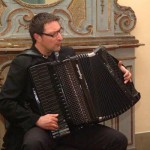 “Accordion is so contagious that hearts jump while listening to it. I don’t know why!” Giacomo Rotatori was born in 1973 in San Lorenzo in Campo near Pesaro. He took a degree in double bass and then changed his plans focusing on the accordion.
“Accordion is so contagious that hearts jump while listening to it. I don’t know why!” Giacomo Rotatori was born in 1973 in San Lorenzo in Campo near Pesaro. He took a degree in double bass and then changed his plans focusing on the accordion.
1. Giacomo Rotatori took a degree in double bass at G. Rossini Conservatory but today he can’t live without his accordion. How did you abandon your double bass in order to play accordion?
I started to play accordion at 12 or 13 because my uncle had got one and I used to play it and with it. In those years I felt in love with accordions. When I was 19 I entered G. Rossini Conservatory just when the accordion became one of the main matter of studies. Everybody wanted to follow that course and older students had right of priority. So I had to make do with double bass. I keep on playing accordion in folk music bands and in 2000 I tried, with success, to enter M. Sergio Scappini class. The following year I bravely decided to abandon double bass in favor of my beloved accordion. In 2001 I attended a summer seminary promoted by ARCEVIA JAZZ Association where I met Simone Zanchini. With him I focused on improvisation while I has studied classical repertoire with Sergio Scappini. I graduated with honours in 2008 but I still study at home with Simone when we have free time.
2. Your repertoire goes from jazz to classical music, from tango to ethnic compositions. Is this your artistic choice or just the belief we don’t have to limit music?
I’ve decided to focus on different musical fields because of my great curiosity. Jazz and classical music are very different languages but they have some peculiarities as well: the improviser’s instinct gives a good command of written music as well as the care of sound and the bellows control are useful in aggressive and rhythmic contexts such as the world of jazz. Different languages disposition opens our mind to all these different styles. Take for example the American jazz icon Winton Marsalis who received a Grammy as the best classical trumpet player or Michel Portal, the pioneer of free jazz, considered also one of the most important classical and contemporary clarinet player. Knowing different musical styles lets me have important relationships. I played with Ensemble Strumentale Scaligero, the famous chamber music group of La Scala di Milano. In 2009, 2010 and 2012 I proudly stood in for Simone Zanchini and this means that you have to be a good improviser but also an expert in classical music.
3. Anyway, is there a kind of music you are much close to?
Of course, it’s jazz of 40’s and 50’s. Thanks to Simone Zanchini I have got closer to Oscar Peterson, Clifford Brown and Charlie Parker’s bebop. Moreover, inspired by Chet Baker and Stan Getz I’ve been appreciated a much more melodic kind of jazz.
As for the accordion, my points of reference are Simone Zanchini, today a friend too, and poor Frank Marocco. Both have got a great sense of swing, unusual for accordionists, and this has made them unique musicians.
As for the academic world, I’ve kept a XX century original repertoire. I’ve found my academic dimension in some musicians who associate music with popular language and dance.
4. Today you also teach accordion. How can you describe this instrument to people who believe it’s just for folk tradition and popular dances?
Its origins are obviously popular but folklore is a very important musical resource just think of Bela Bartok! As for jazz, the American songs are popular pieces. Today popular sounds are very trendy and as for classical music, modern composers use folk as a new sonority which goes well with both strings and wind instruments. New generations love it! Behind this instrument there must be a musician playing his accordion and not a simple accordionist. This is the most important thing.
5. Your career interests both Italy and foreign Countries. Where is much stimulating being a musician in your opinion?
Unfortunately abroad there is much attention towards music even if Italy is the birthplace for so many talented artists. I’m happy with, on one hand, my life in a small but charming town near Pesaro and, on the other, with my experiences abroad where musicians’ works are appreciated without prejudices. Maybe there is stronger awareness towards interesting projects abroad. Anyway I still have my Italian satisfactions.
6. You have been the first musician playing inside Castello Sforzesco in Milan, in 2010 you received a l’Award Orpheus nomination with Amischa. What’s your strongest wish for the future?
I’m happy with these and other gratification. My only regret is not to have played with Maria Schneider at Ancona Jazz. Last year the Colour Jazz Orchestra called the famous American big band director Maria Schneider. She asked for an accordion but then the organization made an American guest replace the accordion performer. I hope to be a eclectic musician for ever, to have important partnership and original projects.
7. Your works derive from stong partnerships: FISA&BASS DUO with Roberto Bartoli, Boulevard Duo with Massimo Morganti, Variazioni sul Tango with Gigi Faggi, Roberto Gazzani, Andrea Morandi. Which part of team work do you prefer? What musician would you chose for a future partnership?
First of all I would like to mention my solo work I SUONI E LE DANZE DEL MONDO and say thank you to Marco Tiranti of EUPHONIA whose accordions are always with me.
As for team work I’ve always search for expert musicians who could enrich me both culturally and musically! In case, we have focused on sound and peculiarity in order to find originality. I’m very lucky because my colleagues are both great musicians and special friends. I think documentation is fundamental so I hope to record all our works as soon as possible.
8. In this period, what are you working on?
I’m going to finish recording VARIAZIONI SUL TANGO with my quartet. We have started from tango to create original compositions; some of them are mine. Typically Argentine sounds are associated with original arrangements or rhythms far from that tradition. The results is a very special and personal tango.
I’m working to INSTANTDANCE, a brand-new duo with the dancer Caterina Fantoni, focusing on readings about water and my arrangements.
On 23rd February I’m debuting with the trio SEMPLICEMENTE D’AMORE (with the double bass player Roberto Bartoli and the singer Nicoletta Fabbri) in Imola. 60’s Italian love songs will be revised thanks to our jazz sound.
I hope to record with the BOULEVARD DUO and the trombone player Massimo Morganti as soon as possible. Our uncommon mach accordion/trombone creates original sounds revising chansonier like Edit Piaf.
I would also mention KRAMER CONTRO KRAMER quintet with Gigi Faggi, Roberto Gazzani, Marco Di Meo and Andrea Morandi and BANDA PELLONI which is a 26 elements orchestra born in the school of popular music in Forlimpopoli where I have been teaching for 10 years.
As for classical music, I’m recording with the composer Angelo Gentili, in spring.
Questo post è disponibile anche in: Italian

 English
English Italiano
Italiano 





Leave a comment
You must be logged in to post a comment.